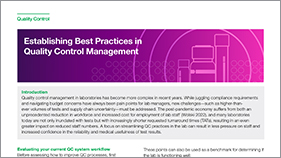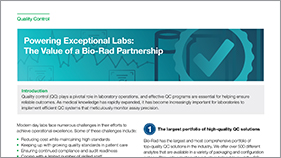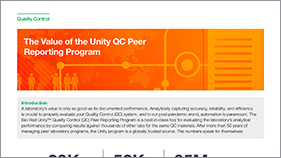
- Share on:
- Bio-rad Twitter
- Bio-rad Facebook
- Bio-rad LinkedIn
Unity QC data management: optimizing your lab to reach performance goals
Introduction
Managing a successful clinical diagnostic lab depends on multiple variables: sufficient budget, well-trained staff, time and resources, reliability of results, and compliance with regulatory standards, to name a few. The added difficulties of the COVID-19 pandemic have complicated lab management Quality Control (QC) systems even more, with reduced staff and supply chain interruptions having become the new normal.1 One of the most effective ways to overcome these obstacles is by increasing reliance on automation and data management software. Bio-Rad Unity Data Management QC software and the Unity Interlaboratory (Peer) Program, the largest community of QC users today, offer solutions to help streamline lab workflows, allowing you to navigate modern challenges more easily. Read more to learn some of the ways Unity can help you manage a better lab in light of today’s challenges.
Regulatory standards, accreditation, and audits
-
Regulatory standards
Participating in a peer review program is encouraged—and in some cases, required—by multiple bodies, including the International Organization for Standardization (ISO) and the Clinical and Laboratory Standards Institute (CLSI).2 ISO 15189:2022 states: “The laboratory shall monitor its performance of examination methods, by comparison with results of other laboratories.”3 The Unity Interlaboratory Program helps meet this requirement.
-
Accreditation
Many labs seek accreditation to instill confidence in their test results by demonstrating a commitment to high standards. Supervisor Reports and traceability of comments and actions provided through Unity can help document and comply with requirements to gain accreditation through local bodies such as College of American Pathologists (CAP) or international standards like ISO 15189.
-
Audits
Audits can require a heavy trail of paperwork, so it makes sense to let a QC data management program do the bulk of the work. Unity’s online repository can store reports for two years, with the capability of downloading them for longer storage if required. In addition, Unity allows labs to digitally sign reports for use in audits. The Audit Trail Report specifically records every event that affects QC evaluation, making it easy to comply with requirements like FDA CFR Part 11.
Monitoring and controlling conditions
Another advantage of data management software is the ability to monitor the lab’s QC performance daily instead of relying only on periodic proficiency testing (PT). Observing day-to-day trends and shifts compared to other laboratories using the same control materials and test methods can enable real-time troubleshooting if QC results are testing out of range. In addition, the Unity Statistical Process Control (SPC) Rules feature allows labs to set and evaluate performance goals, and with the Bench and Supervisor Review feature, labs can set alerts to prevent out-of-control test results from being released.
Scalability and more reliable results
Reliability is a foundation of QC. Unity is the best-in-class QC interlaboratory data reporting program not only due to Bio-Rad Laboratories’ 50+ years of experience in quality control management, but because of its extensive global reach, which quantifies to more reliable test results. The Unity peer program provides confidence in test results by allowing a lab to easily conduct comparisons via instant access to reports. The combination of the wide range of QC products being tested, over 38,000 participating laboratories across 100+ countries, and over 59,000 instruments means the lab’s QC results are being measured against the best available set of peers.
Download the full article PDF

Conclusion
It is more complicated than ever before to manage a successful, reliable laboratory. Bio-Rad’s Unity QC Data Management solution and Unity Interlaboratory Program options help labs maintain regulatory standards, gain accreditation, undergo audits with ease, and have confidence in managing the lab with the most accurate day-to-day analysis on the market. Better QC data management means minimized patient risk, and more reliable and consistent test results for improved patient outcomes. Visit www.bio-rad.com/en-us/a/qm/data-management-systems to explore Bio-Rad’s full portfolio of Unity QC data management options.
References
1. Caldwell, B., Hilborne, L.H., Kroft, S., and Sossaman, G. Laboratory Supply Shortages: Turning Crisis to Opportunity. (2022, March). American Journal of Clinical Pathology, Volume 158, Issue 2. Retrieved from: https://academic.oup.com/ajcp/article/158/2/158/6539925, accessed May 7, 2023.
2. CLSI: C24 A4: Statistical Quality Control for Quantitative Measurement Procedures: Principles and Definitions, 4th Edition. CLSI; Wayne, PA. 2016.
3. ISO 15189:2022. Medical laboratories—Requirements for quality and competence. Geneva, Switzerland: International Organization for Standardization; 2022.
Recommended Features
-

Establishing Best Practices in Quality Control Management
Streamline QC practices in your lab to optimize QC workflows and increase confidence in the accuracy of test results.
-

Powering Exceptional Labs: The Value of Bio-Rad Partnership
Learn how Bio-Rad helps support labs with independent quality controls, data management, peer programs and more.
-

The Value of the Unity QC Peer Reporting Program
Learn more about a QC peer reporting program to help increase lab performance, test reliability, and regulatory compliance.
